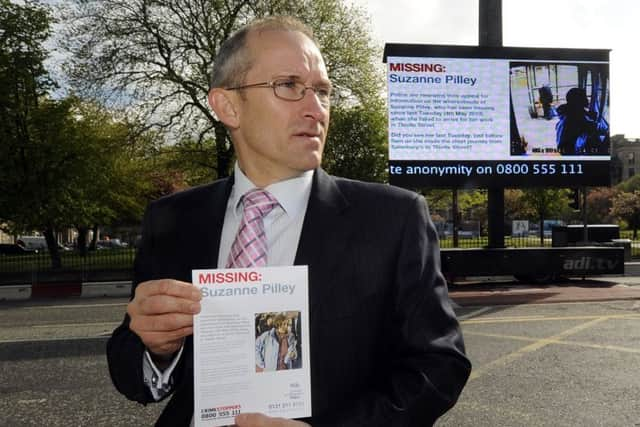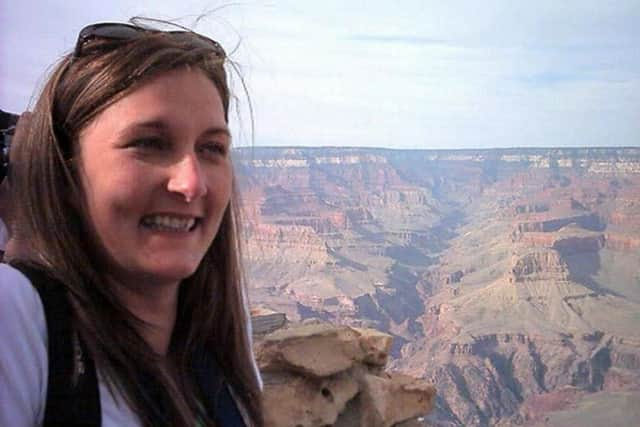Killer convicted of the murder of Edinburgh bookkeeper Suzanne Pilley reveals plan to appeal in new podcast
and live on Freeview channel 276
Podcast-maker Sophie Ellis is recalling the first time she met David Gilroy, the man currently serving life for the murder of Suzanne Pilley.
The high-profile investigation into the disappearance of the 38-year-old bookkeeper, last seen on CCTV alighting from a bus on Princes Street on her way to work, was the focus of intensive police enquiries that culminated in the arrest and conviction of her ex-lover in 2012, despite her body never being found.
Advertisement
Hide AdAdvertisement
Hide AdIn Body of Proof, a new 10-part podcast examining the case, Gilroy, now 56, speaking for the first time since his conviction, maintains his innocence and insists he will “fight to his dying breath” to clear his name, while revealing he is preparing a fresh appeal against his sentence.


Body of Proof is an intriguing and at times gruelling five-hour listen, presented by TV documentary makers Sophie Ellis and Darrell Brown.
It’s the result of almost two years combing through evidence and attempting to answer what they describe as ‘a hundred unanswered questions’ about the case.
Recalling the genesis of the project, Ellis says, “Darrell and I are both television producers, Darrell specifically makes documentaries which focus on crime.
Advertisement
Hide AdAdvertisement
Hide Ad“Over a drink one evening he mentioned he’d received a letter from the step-mum of a man in prison for murder and that she was convinced of his innocence.


“He showed me the letter and I immediately Googled the case, reading as much as I could about David and Suzanne.”
That letter was from Gilroy’s stepmother, Linda Gilroy, a former Labour MP who has long protested his innocence.
Brown adds, “I was intrigued enough to send a speculative email just seeking a bit more information.
Advertisement
Hide AdAdvertisement
Hide Ad“What came back was a long letter from David’s step mum, essentially saying that everything I would read about the case wouldn’t tell me the full story.


“It was clear that there was something bigger to explore - regardless of whether the conviction itself was right.”
With Gilroy already serving his life term, the pair admit it was difficult to come to the case without preconceptions.
“We all like to think that our justice system and the police always get it right. The same goes for a jury.
Advertisement
Hide AdAdvertisement
Hide Ad“And in this case specifically, so much had been written about David that when we went to visit him for the first time in prison, we were both nervous because we didn’t doubt his guilt,” concedes Ellis.
Brown agrees, “It’s inevitable that when you first read the case details you assume there can be no alternative other than David’s guilt.
“Equally - when I’d read Linda’s letter I assumed there had to be some doubts.
“The only way to look properly at the case was to get rid of any preconceptions and look at everything with a clean slate.”
Advertisement
Hide AdAdvertisement
Hide AdHe qualifies that with, “The only preconception I suppose we had, was around the justice system.
“I presumed a trial would hear all of the information available and a jury would have everything at their disposal to make a decision.
“We learned that, for various reasons, the jury in this trial didn’t learn about everything they might have.”
From the outset, the Pilley family made it clear they had no wish to be involved as Ellis and Brown considered ‘over-looked evidence’ and spoke to people who knew both Pilley and Gilroy, attempting to put the pieces together.
Advertisement
Hide AdAdvertisement
Hide Ad“I wasn’t allowed into the prison on the first visit,” says Ellis, “so by the time my first visit with David came around, I had absorbed information from both the press and from Darrell’s first visit.”
“I was on high alert for any indication that he was trying too hard or ‘steering’ us in any way - was he being too self-assured, too self-deprecating?
“Was he being too measured in his answers to ensure he wasn’t caught out in a lie, or was he trying too hard to make us like him.
“But my first impressions were none of those things. He seemed likeable and nice. I was ready to actively dislike David, but my honest reaction was that, to my surprise, I liked him.”
Advertisement
Hide AdAdvertisement
Hide AdBrown reflects, “I found him stand-off-ish, guarded and tricky, at first.
“Perhaps that was a sign he was sizing me up and nervous of the media.
“It’s fair to say that as we got to know David more we experienced some of the quirks in his character.
“He’s very detailed in his answers, sometimes to the point of covering his back or being pedantic - and we wrestled with whether that was a sign of someone constructing a web of lies, or someone trying their utmost to give a full and accurate account, perhaps scarred by being in prison.”
Advertisement
Hide AdAdvertisement
Hide AdListeners can decide for themselves as Gilroy pleads his case in an often distant delivery.
Reconstructing evidence, tallying witness statements and examining CCTV footage, Ellis and Brown accept the ‘balance of proof’ ebbed and flowed constantly.
“All the way through our interactions with David and our deep dive into the case, it’s been both frustrating and eye-opening,” says Ellis.
“There are two contradictory explanations for almost every piece of the puzzle. One sinister and one completely ordinary.”
Advertisement
Hide AdAdvertisement
Hide Ad“For example, the idea that David bought air fresheners on the day that Suzanne went missing was used to suggest he’d bought them to conceal the smell of a body.
“He maintains they were for the loo in his home.
“It made me wonder about how many innocent actions we all make every day, which could be used against if they were contextualised differently.
“In a case with no body and no forensics, it worried me that things had been presented so definitively.
“Throughout, we changed our stance many times.”
Brown adds, “There were moments early on where we felt 100% David was guilty.
Advertisement
Hide AdAdvertisement
Hide Ad“And moments when we uncovered something which made us 100% sure he was innocent.
“It’s fair to say that we didn’t always agree - or interpret evidence in the same way.
“But ultimately, the more we got into the case the more we realised not everything we’d read and been told could be accurate.
“It became a task of trying to verify the truth from various rumours, claims, and reports.”
Advertisement
Hide AdAdvertisement
Hide AdCertain conflicts they discovered need to be re-examined, insist the pair.
“I think the CCTV evidence should be reconsidered,” says Ellis.
“This isn’t about nit-picking, or technicalities, it’s about assessing what standard of proof should we accept as standard; how do we want the system to work?, a question both Darrell and I had to do a lot of soul-searching about.”
She asks, “Is it preferable to put a potentially guilty person in prison without sufficient proof or, if there isn’t enough proof, should a potentially guilty person go free to maintain the confines of the justice system?”
Advertisement
Hide AdAdvertisement
Hide AdBrown too believes that, almost a decade after the events, various aspects of the case are yet to be fully revealed.
“There’s a car, which police appealed for information about, that bugged us as reporters.
“That’s not to say we think it was involved - but we wanted to know more about what it was doing, and what the driver might have been able to add to the enquiry.
“And I’d want to know more about the end of the relationship between David and Suzanne.
Advertisement
Hide AdAdvertisement
Hide Ad“The jury heard a pretty one-sided version of how they broke up, and an account of David’s behaviour towards her - and we’d want to find out how much of that claim was true.”
What they did uncover surprised them, however.
“I’ve been consistently surprised by this case.
“Innocent or guilty, David Gilroy is a fascinating case in human psychology and what people are capable of...” says Brown, “Whether that’s keeping sane and strong as a victim of a miscarriage of justice, or maintaining a consistent web of lies rather than admit guilt and ending a family’s suffering”.
Accepting that their investigations have proved disturbing on numerous levels, Ellis reflects, “The most disturbing this about this case is the torment of Suzanne Pilley’s family.
“Regardless of David’s guilt, they cannot have any form of closure without knowing what happened to Suzanne and where she might be, and that is simply heartbreaking.
Advertisement
Hide AdAdvertisement
Hide Ad“Even if David were proved innocent, it wouldn’t change the Pilley’s need for knowledge about Suzanne’s whereabouts and the tragedy of that is incomprehensible to me.”
Ellis concludes, “We think it’s the only case where there is no forensic evidence, no confession, no witness and where the victim’s body hasn’t been found.”
“It’s a complex case and one that could only be explored properly in a podcast series that dedicates five hours to unpicking it.
“One conclusion we can speak about is that the case goes on - because there are lots of unanswered questions, not least where Suzanne’s remains are situated.
Advertisement
Hide AdAdvertisement
Hide Ad“It’s important that Suzanne’s story and the ongoing upset for her family is reflected too.”
A Police Scotland spokesperson talking on Body of Proof states, “David Gilroy was convicted of the murder of Suzanne Pilley following a thorough investigation by Lothian and Borders Police.
“Detective Superintendent Stuart Houston continues to lead the investigation to find Suzanne.
“We will pursue all possible lines of enquiry to locate her and bring her home to her family.”
Body of Proof is available to download now on Audible